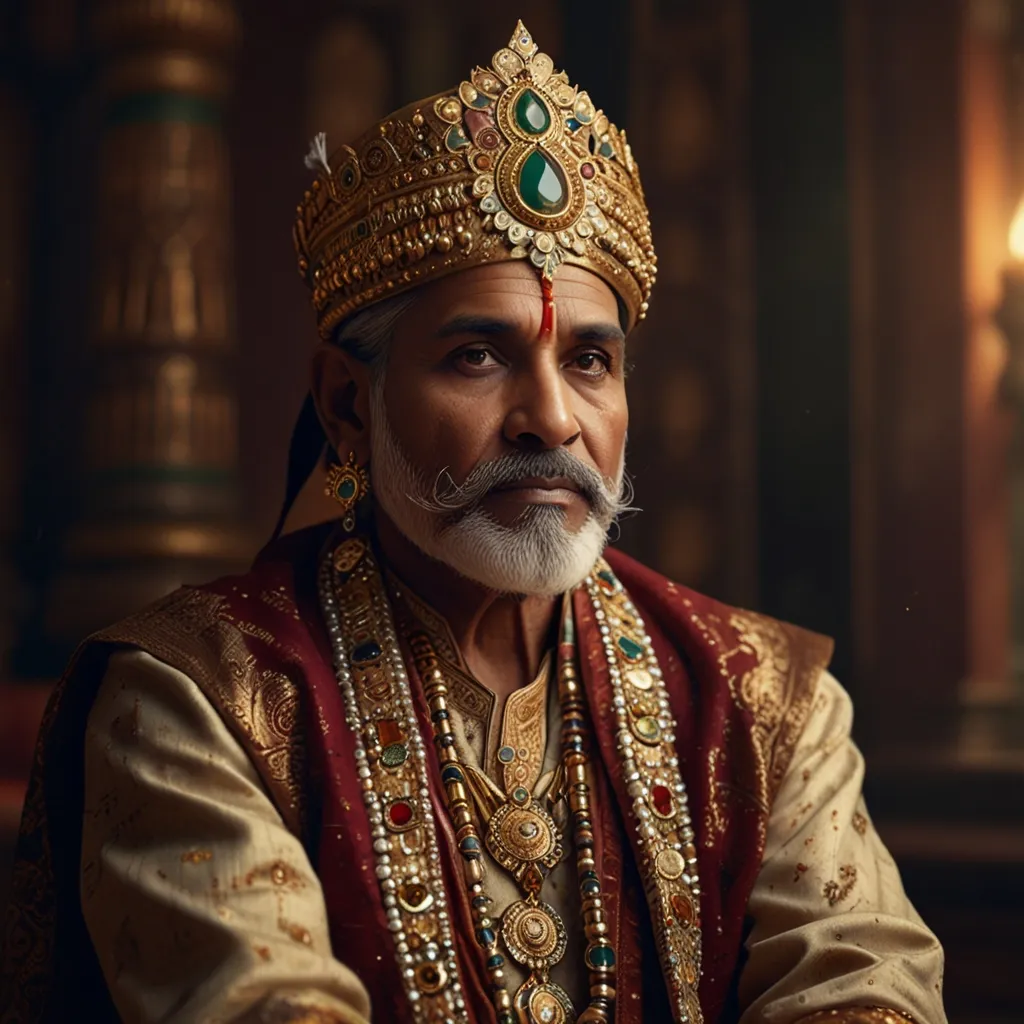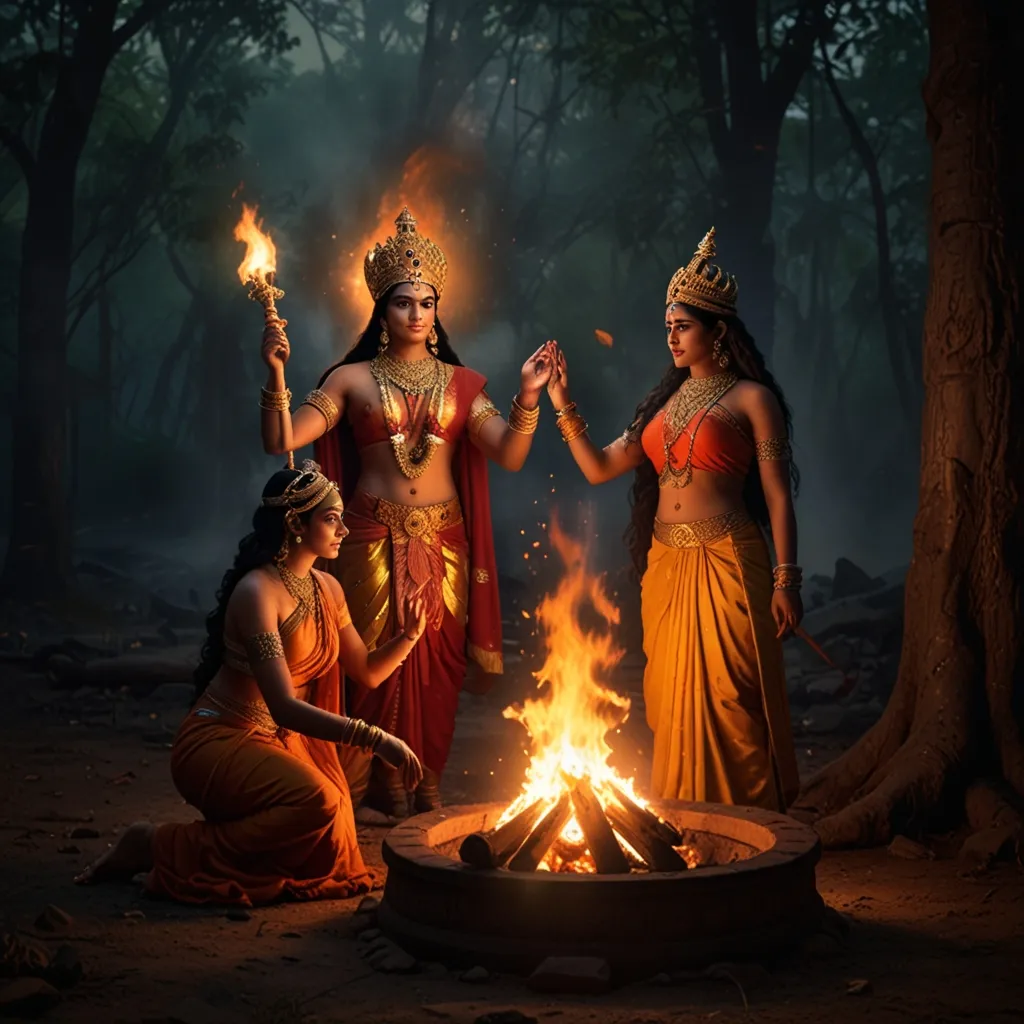In the ancient kingdom of Hastinapura, nestled in the heart of India, there lived a warrior of unimaginable sacrifice and dedication, whose name would echo through the ages - Bhishma. His story, steeped in heroism and selflessness, is one of the most celebrated tales in Hindu mythology.
Bhishma’s saga began at birth as Devavrata, the beloved son of King Shantanu and the river goddess Ganga. Growing up in the Kuru dynasty, young Devavrata was the epitome of bravery, sagacity, and filial devotion. King Shantanu, a wise and just ruler, enjoyed a peaceful reign, partly due to the respect commanded by his son.
The dramatic twist in this epic tale came when King Shantanu, while traversing the shores of the Ganges, encountered Satyavati, a fisherman’s daughter. Struck by her beauty, Shantanu desired to make her his queen. However, Satyavati’s father presented an unexpected condition: her future offspring should inherit the throne of Hastinapura.
This proposition posed a massive problem. Devavrata, Shantanu’s son, was the rightful heir. Seeing his father’s despair and foreseeing the looming succession conflict, Devavrata took it upon himself to solve it. In a moment of unrivaled bravery, Devavrata vowed never to marry or father children, thus ensuring that Satyavati’s progeny would rule unchallenged. This incomparable pledge, known as the Bhishma Pratigya, or the “terrible vow,” earned him the revered name of Bhishma.
But Bhishma’s vow of celibacy was just the beginning. He also swore unwavering loyalty to the throne of Hastinapura, pledging his life to serve the kingdom, come what may. These twin vows defined Bhishma’s character, guiding his actions through tumultuous times, including the cataclysmic Kurukshetra war.
The ramifications of Bhishma’s vows were profound. King Shantanu, profoundly moved by his son’s sacrifice, blessed him with the boon of Ichhamrityu, granting Bhishma the power to choose the time and manner of his death. Bhishma’s long life was a testament to his fortitude, but it was also filled with trials, as he witnessed the moral and political decay of his lineage. His dedication to his vows often left him powerless to avert the calamities that befell his family.
Throughout his life, Bhishma’s steadfast commitment sometimes led to controversial decisions. One such moment was his helplessness during the public humiliation of Draupadi, the queen of the Pandavas, during the infamous dice game. Bhishma’s adherence to his vows meant he could not oppose the ruler’s actions, even when they were unjust. This incident underscored the complex nature of righteousness and the harsh trials of maintaining one’s principles in dire circumstances.
Bhishma’s life was a series of pivotal events that shaped the narrative of the Mahabharata. His valorous reputation was known far and wide. A notable episode was the abduction of the princesses Amba, Ambika, and Ambalika from their swayamvara. This bold act led to a fierce conflict with the other suitors, including Ambika’s lover, Shalva, who was defeated by Bhishma. This incident set off a chain of events leading to the monumental battle of Kurukshetra and eventually, Bhishma’s death.
The tale of Bhishma’s vow is a shining example of his exceptional character and utter dedication to duty. His sacrifices, even at great personal cost, earned him immense respect and a lasting place in Hindu mythology. Bhishma’s life story is celebrated as a pinnacle of selflessness, offering essential moral lessons within the epic’s grand narrative.
The narrative of Bhishma underscores many vital lessons for our daily lives. Self-sacrifice for the greater good lies at the heart of his story. Bhishma’s decisions highlight the importance of prioritizing the needs of family and community over personal ambition. Another key lesson is the embodiment of truth and integrity. Despite the significant personal toll, Bhishma was unwavering in his commitments, showing the importance of maintaining integrity, even during life-altering decisions.
Bhishma’s story teaches the power of self-discipline and the control of desires. His ability to renounce his rightful claim to the throne and vow lifelong celibacy for his father’s happiness showcases extraordinary self-control. In our own lives, practicing self-discipline can lead to a more focused, fulfilling, and ethical existence.
The tale also underscores handling dilemmas and making tough decisions with clarity and a noble heart. When faced with difficult situations, approaching them with a sense of duty, respect for others, and a willingness to sacrifice personal gain for the collective good often leads to the most honorable outcomes.
Moreover, the recognition of Bhishma’s sacrifices through the boon of choosing his death time highlights the importance of acknowledging and appreciating the sacrifices others make for our benefit. As we navigate through life, acknowledging and valuing the efforts and sacrifices of those around us nurtures bonds and fosters a culture of gratitude and mutual respect.
Bhishma’s dedication to his vows influenced the Mahabharata’s events significantly. His loyalty to the throne, despite the ruler’s morality, placed him in many tough spots. During the Kurukshetra war, Bhishma faced a dilemma with Shikhandi, born a woman but later became a man. Bhishma had vowed never to fight anyone not born a man. True to his word, he laid down his weapons, leading to his eventual death.
Bhishma’s story is a powerful reminder of duty, sacrifice, and integrity. His life serves as an inspiration, teaching us about self-discipline, desire control, and recognizing and appreciating the sacrifices of others. Bhishma’s vow remains a vibrant symbol of selflessness and dedication, solidifying his legacy as one of Hindu mythology’s most revered figures. His tale continues to inspire, serving as a timeless moral compass for those who seek to live with honor and devotion.






